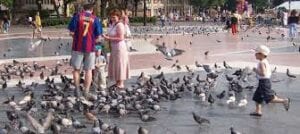Authorities in the Spanish city of Cádiz have come up with a plan for their booming pigeon population – relocating some 5,000 birds.
The city is plagued by thousands of the birds and their associated waste – but officials did not want to poison them.
Instead, the plan is to capture thousands of pigeons and relocate them hundreds of miles away in a different region – and hope they do not return.
Local officials said it was a “more respectful and sustainable” solution.
Speaking to local newspaper Diario de Cádiz, councillor Álvaro de la Fuente said “managing the population of existing pigeons does not imply the eradication of them within the urban area.”
Instead, he said a “logical balance” between the birds, humans, and other city-dwelling species was the goal.
The common pigeon is known for its location awareness – the famous homing pigeon used to carry war-time messages is a variant of the species.
But unlike their trained counterparts, the wild birds are often happy to settle in one local area – and officials in Cádiz hope that will be the case when all 5,000 pigeons are placed in their new home.

The thousands of birds to be relocated will be trapped, catalogued, and tested before being carried at least 170 miles (275km) away for release. Every bird will also get a health check along the way.
But pigeons breed quickly – so the city plans to print thousands of leaflets reminding the public not to overfeed the remaining flock, which helps to inflate the population.
In London’s Trafalgar Square, where the tradition of deliberately feeding the birds was immortalised in Disney’s Mary Poppins film, the birds flocked in great numbers until the early 2000s.
A combination of banning the feed sellers and a hefty fine on those who feed the flock anyway was part of the solution – while the introduction of hawks was another.
Today, a professional falconer accompanies a Harris hawk or peregrine falcon to Trafalgar Square several times a week – a natural predator which warns off the less welcome, smaller bird.
The same technique is used at a number of other London landmarks including BBC Broadcasting House and the Wimbledon tennis complex. It scares the birds away from one area and disperses them more widely – but does not affect the actual population much.
Pigeon Patrol Products & Services is the leading manufacturer and distributor of bird deterrent (control) products in Canada. Pigeon Patrol products have solved pest bird problems in industrial, commercial, and residential settings since 2000, by using safe and humane bird deterrents with only bird and animal friendly solutions. At Pigeon Patrol, we manufacture and offer a variety of bird deterrents, ranging from Ultra-flex Bird Spikes with UV protection, Bird Netting, 4-S Bird Gel and the best Ultrasonic and audible sound devices on the market today.
Voted Best Canadian wholesaler for Bird Deterrent products ten years in a row.
Contact us at 1- 877– 4– NO-BIRD, (604) 585-9279 or visit our website at www.pigeonpatrol.ca
Pigeon/Pigeon Patrol / Pigeons Roosting / Vancouver Pigeon Control /Bird Spikes / Bird Control / Bird Deterrent / Pigeon Deterrent? Surrey Pigeon Control / Pest /Seagull deterrent / Vancouver Pigeon Blog / Birds Inside Home / Pigeons in the cities / Ice Pigeons/ What to do about pigeons/ sparrows , Damage by Sparrows, How To Keep Raccoons Away, Why Are Raccoons Considered Pests/ De-fence / Pigeon Nesting/ Bird Droppings / Pigeon Dropping/ woodpecker control/ Professional Bird Control Company/ Keep The Birds Away/ Birds/rats/ seagull/pigeon/woodpecker/ dove/sparrow/pidgeon control/pidgeon problem/ pidgeon control/flying rats/ pigeon Problems/ bird netting/bird gel/bird spray/bird nails/ bird guard

